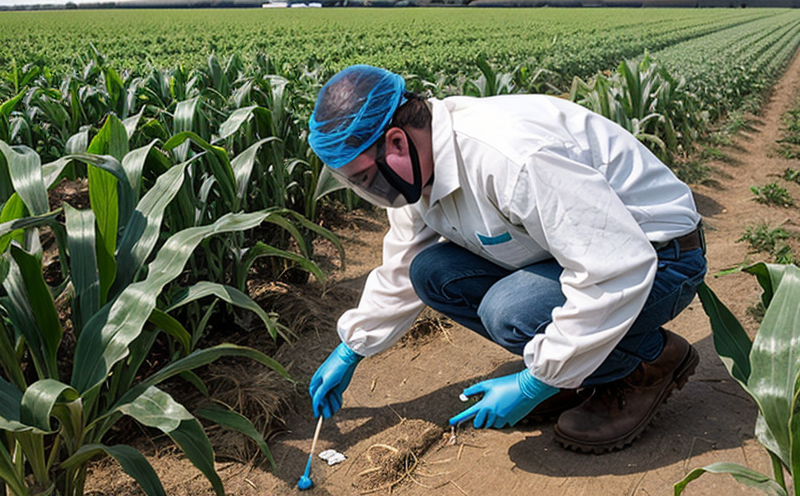Comprehensive Pesticide Residue Profiling in Crops
The Comprehensive Pesticide Residue Profiling service is designed to ensure that crops meet international safety and regulatory standards. This service involves a meticulous process of identifying, quantifying, and reporting pesticide residues present in agricultural products such as fruits, vegetables, grains, and other crops. Our state-of-the-art laboratory facilities use advanced analytical techniques to achieve precision and accuracy in residue detection.
Our service is particularly important for the agriculture and forestry sectors where pesticides are commonly used to protect crops from pests and diseases. The presence of pesticide residues can have significant implications on consumer health, especially when they exceed safe limits set by regulatory bodies like the European Food Safety Authority (EFSA) or the World Health Organization (WHO).
The service includes a series of steps that begin with sample collection, followed by thorough preparation to ensure the integrity and accuracy of the test results. Once prepared, samples undergo a rigorous analytical process using techniques such as Gas Chromatography-Mass Spectrometry (GC-MS) or Liquid Chromatography-Tandem Mass Spectrometry (LC-MS/MS). These methods are capable of detecting extremely low levels of pesticides.
The service also involves detailed documentation and reporting of findings, including the identification of specific residues present in the sample. This information is crucial for quality managers to make informed decisions about crop safety and compliance with international standards like ISO 18567:2019 for pesticide residue analysis in foodstuffs.
Our expertise extends beyond just detection; we also provide recommendations for corrective actions if residues are found above acceptable levels. This ensures that the agricultural sector can take immediate steps to rectify any issues and maintain compliance with regulatory standards.
To ensure reliability, our laboratory adheres strictly to international standards such as ISO/IEC 17025:2017, which governs the competence of testing and calibration laboratories. This commitment ensures that every test result is accurate, reliable, and repeatable, providing clients with confidence in our services.
In addition to these technical aspects, we also offer comprehensive training programs for quality managers and compliance officers. These sessions cover best practices for sample collection, handling, and preparation, as well as the latest developments in pesticide residue testing techniques.
Why It Matters
The importance of Comprehensive Pesticide Residue Profiling cannot be overstated. In an era where food safety is a global concern, ensuring that agricultural products are free from harmful residues is paramount. This service plays a critical role in safeguarding public health by preventing the consumption of crops contaminated with excessive pesticide levels.
- Consumer Health: Excessive pesticide residues can lead to various health issues including toxicity and allergic reactions. By ensuring that pesticides are within acceptable limits, we protect consumers from potential harm.
- Regulatory Compliance: Failure to comply with international standards can result in severe penalties for non-compliance. This service helps agricultural businesses stay ahead of regulatory changes and avoid costly fines.
- Brand Reputation: A reputation for producing safe, high-quality crops is crucial for any agricultural business. Our profiling service enhances brand reputation by demonstrating a commitment to product safety.
The stakes are high in the agriculture and forestry sectors where trust in food safety is critical. By offering this comprehensive service, we contribute significantly to maintaining that trust.
Quality and Reliability Assurance
At our laboratory, quality and reliability assurance are integral to every aspect of our operations. We employ a rigorous quality management system that meets the requirements of ISO/IEC 17025:2017, ensuring that all tests conducted are accurate, precise, and reliable.
- Standard Operating Procedures: Our laboratory follows stringent standard operating procedures (SOPs) to ensure consistent results across all tests. These SOPs cover every step of the testing process from sample preparation to final analysis.
- Instrument Calibration: All analytical instruments are regularly calibrated and validated using certified reference materials, ensuring that they provide accurate data.
- Data Integrity: Our robust data management systems ensure that all test results are accurately recorded and stored. This helps in maintaining a comprehensive history of each test run for future reference.
We also participate in proficiency testing programs organized by reputable organizations such as the European Co-operation for Accreditation (EA) to validate our proficiency in pesticide residue analysis. Our consistent performance in these programs further reinforces our commitment to quality and reliability.
Our dedicated team of scientists and technicians is continuously trained on the latest methods and technologies, ensuring that we stay at the forefront of analytical science. This ongoing education ensures that our laboratory remains a leader in providing accurate and reliable pesticide residue profiling services.
Environmental and Sustainability Contributions
The Comprehensive Pesticide Residue Profiling service not only benefits consumer health but also contributes to environmental sustainability efforts. By identifying and quantifying pesticide residues, we help agricultural businesses make informed decisions that minimize the ecological impact of their practices.
- Eco-Friendly Practices: Understanding the presence and levels of pesticides allows for the implementation of eco-friendly practices such as integrated pest management (IPM). This approach reduces reliance on chemical pesticides and promotes biodiversity.
- Resource Efficiency: By optimizing pesticide use through detailed profiling, we help reduce waste and improve resource efficiency in agricultural operations. This contributes to broader sustainability goals by minimizing the environmental footprint of crop production.
The service also supports sustainable development objectives by promoting good agricultural practices that are mindful of both human health and environmental impact. Our commitment to these principles underscores our dedication to contributing positively to global sustainability initiatives.





